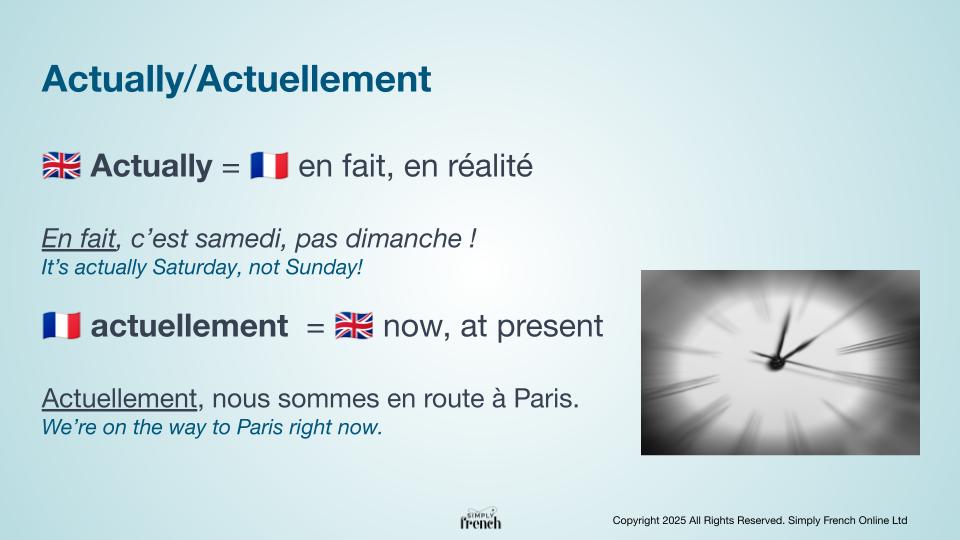The difference between ‘Actuellement’ & ‘En fait’ and more false friends
Jan 13, 2025False friends - love ‘em or hate ‘em!
Here are a few to digest and get to love so you don’t make this mistake, either again or for the first time.
As Anglophones, we often say “actually” but when we translate it, we end up incorrectly saying “Actuellement”, which means “Right now/at this moment”.
And there are more in this, the first of a mini-series of false friends to help steer you through that lovely minefield of vocabulary in French.
Make your learning easier and discover:
- The difference between ‘Actuellement’ & ‘En fait’
- How to use the words ‘affair/affaire, bra/bras, bless/blesser attend/assister’
- Ways to remember these false friends

The difference between ‘Actuellement’ & ‘En fait’.
This is a mistake almost all French students make. The two words look so similar. Yet, the meaning differs completely.
- En fait, en réalité >>> actually
- Actuellement >>> now, at present
Let’s have a look at full sentences:
- En fait, c’est samedi, pas dimanche ! >>> It’s actually Saturday, not Sunday!
- Actuellement, nous sommes en route à Paris. >>> We’re on the way to Paris right now.

One is related to relationships and the other to business.
Be sure not to mix them up…
- Une aventure, une liaison (amoureuse) >>> an affair
- Une affaire >>> a business matter
Here are examples for you:
- Sa liaison était un grand secret ! >>> His affair was a big secret!
- C’est une affaire compliquée. >>> It’s a complex business matter.

The two verbs look just the same. They share a meaning but the context is different.
- aider >>> to assist
- assister >>> to attend
Let’s see how they work:
- Veux-tu que je t’aide ? >>> Do you want me to assist / help you?
- Désolé, je ne peux pas assister à la réunion. >>> Sorry, I can’t attend the meeting.

The following words are definitely false friends. They may look identical. Nonetheless, they have a completely different meaning.
- Bénir >>> to bless
- Blesser >>> to hurt
Have a look at them in action:
- Tu es béni, mon ami ! >>> You are blessed, my friend!!
- Je me suis blessé quand je suis tombé. >>> I hurt myself when I fell.

Try not be confused by these two because it’s hilarious!
- Un soutien-gorge >>> a bra
- Un bras >>> an arm
Here how to use them:
- Ce soutien-gorge est très joli. >>> This bra is very pretty.
- Elle a de longs bras. >>> She’s got long arms.

Tips to learn false friends in French.
To start with, choose one thing at a time and master it. Once you do, you can add more to your list.
Then, say it aloud to memorise it.
The word is not enough. Indeed, if you put it into context with your own example it will facilitate.
Then, you want to practice as much as possible or you will forget it.
In a nutshell, there is no need to learn a lot. You would better apply your learning in order to speak French simultaneously with confidence.
 In this mini-lesson, you have covered the following false-friends:
In this mini-lesson, you have covered the following false-friends:
- En fait, en réalité >>> actually vs actuellement >>> now, at present
- Une aventure, une liaison (amoureuse) >>> an affair vs une affaire >>> a business matter
- aider >>> to assist vs assister >>> to attend
- Bénir >>> to bless vs blesser >>> to hurt
- Un soutien-gorge >>> a bra vs un bras >>> an arm
Are you interested in learning more about French vocabulary? You may be interested in these mini-lessons:
sembler ressember à se ressembler
So, tell me, among the 5 pairs of false friends, which one will you remember most and why?
Free Masterclass
Learn my 4 step method of how to hold meaningful french conversations the R.E.A.L. way in just 30 minutes a day.
When you signup, we'll be sending you weekly emails with additional free content

